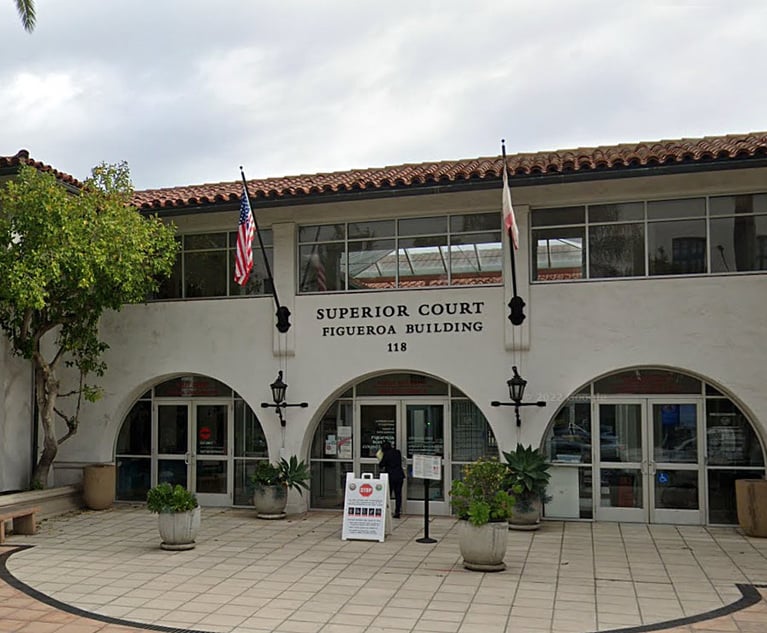 A Commission on Judicial Performance document in the ethics case against Steven Bailey.
A Commission on Judicial Performance document in the ethics case against Steven Bailey.Former El Dorado Judge Is Banned From Serving on Bench Ever Again
Steven Bailey called the censure "a political hit by a Democrat-dominated commission designed to damage me politically."
February 27, 2019 at 04:25 PM
4 minute read
Steven Bailey, the former trial court judge and unsuccessful Republican attorney general candidate in 2018, has been barred from ever holding a judicial office in California again.
The Commission on Judicial Performance announced Wednesday it has censured Bailey for misconduct committed during his eight years on the El Dorado County bench, which ended with his 2017 retirement. The punishment is the most severe that the commission can level short of removing a sitting judge from office.
“We believe there is a very high probability that Judge Bailey will engage in future misconduct if he were to return to the bench,” commissioners wrote. “There is little likelihood of reform when a judge has engaged in multiple ethical violations on and off the bench during the entire course of his or her judicial career, fails to appreciate the impropriety of the misconduct, and continues to engage in the same conduct despite being advised of the ethical impropriety.”
Reached by text on Wednesday, Bailey called the censure “a political hit by a Democrat-dominated commission designed to damage me politically.” Bailey said he “sought, received, and followed ethics advice … that is now being second-guessed 10 years later.”
The majority of the commission's 11 members were Democrats at the time they were appointed. The politicians and political bodies that appointed them—the governor, the Assembly speaker, the Senate Rules Committee and the California Supreme Court—are all Democrats or have Democratic majorities.
Asked for comment about Bailey's claims, Gregory Dresser, the commission's director and chief counsel, pointed to an exchange from the Jan. 30 hearing on the charges. Bailey had been asked by CJP Chairwoman Nanci Nishimura whether he believed the proceedings amounted to political retaliation.
“I'm not suggesting that,” Bailey said, according to a transcript of the hearing. “But in, you know, the height of a political campaign, when the commission staff … they file an accusation based on conduct that was at that point over six months old … there was almost no action other than letters from the commission staff up until I announced I was going to retire. And then all of a sudden, it went into hyperspeed.”
The California Supreme Court has the discretion to review the commission's censure. Bailey did not respond to a question about whether he will ask the California Supreme Court to do so.
Bailey was charged with 12 acts of wrongdoing, ranging from placing defendants in an alcohol monitoring program without publicly disclosing that the vendor employed his son to improperly using his judicial title to fundraise and campaign for attorney general.
Bailey said he received an ethics opinion in 2009 from the California Judges Association that concluded the then-judge did not have to include his son's connection to the monitoring company as long as he did not testify in Bailey's court. A three-judge panel of special masters that reviewed the disciplinary case against Bailey said the judge left out key information when seeking the opinion: that his son provided written monitoring reports to his court.
Bailey also argued he did not violate any canons barring judges from campaigning for other offices because he was conducting an exploratory, not an actual, campaign before he filed his official candidacy on Feb. 25, 2018. Bailey said that rules requiring him to take an unpaid leave of absence from the bench before campaigning for attorney general violated his First Amendment rights.
“The masters rejected these arguments, as do we,” the commission wrote. “Judge Bailey violated the Code of Judicial Ethics by soliciting contributions and conducting both an exploratory and actual campaign for nonjudicial office, and using the prestige of judicial office to do so.”
This content has been archived. It is available through our partners, LexisNexis® and Bloomberg Law.
To view this content, please continue to their sites.
Not a Lexis Subscriber?
Subscribe Now
Not a Bloomberg Law Subscriber?
Subscribe Now
NOT FOR REPRINT
© 2025 ALM Global, LLC, All Rights Reserved. Request academic re-use from www.copyright.com. All other uses, submit a request to [email protected]. For more information visit Asset & Logo Licensing.
You Might Like
View All


Santa Barbara Judge Accused of Moonlighting as Attorney for Secretary/Girlfriend
4 minute readTrending Stories
- 1Restoring Trust in the Courts Starts in New York
- 2'Pull Back the Curtain': Ex-NFL Players Seek Discovery in Lawsuit Over League's Disability Plan
- 3Tensions Run High at Final Hearing Before Manhattan Congestion Pricing Takes Effect
- 4Improper Removal to Fed. Court Leads to $100K Bill for Blue Cross Blue Shield
- 5Michael Halpern, Beloved Key West Attorney, Dies at 72
Who Got The Work
Michael G. Bongiorno, Andrew Scott Dulberg and Elizabeth E. Driscoll from Wilmer Cutler Pickering Hale and Dorr have stepped in to represent Symbotic Inc., an A.I.-enabled technology platform that focuses on increasing supply chain efficiency, and other defendants in a pending shareholder derivative lawsuit. The case, filed Oct. 2 in Massachusetts District Court by the Brown Law Firm on behalf of Stephen Austen, accuses certain officers and directors of misleading investors in regard to Symbotic's potential for margin growth by failing to disclose that the company was not equipped to timely deploy its systems or manage expenses through project delays. The case, assigned to U.S. District Judge Nathaniel M. Gorton, is 1:24-cv-12522, Austen v. Cohen et al.
Who Got The Work
Edmund Polubinski and Marie Killmond of Davis Polk & Wardwell have entered appearances for data platform software development company MongoDB and other defendants in a pending shareholder derivative lawsuit. The action, filed Oct. 7 in New York Southern District Court by the Brown Law Firm, accuses the company's directors and/or officers of falsely expressing confidence in the company’s restructuring of its sales incentive plan and downplaying the severity of decreases in its upfront commitments. The case is 1:24-cv-07594, Roy v. Ittycheria et al.
Who Got The Work
Amy O. Bruchs and Kurt F. Ellison of Michael Best & Friedrich have entered appearances for Epic Systems Corp. in a pending employment discrimination lawsuit. The suit was filed Sept. 7 in Wisconsin Western District Court by Levine Eisberner LLC and Siri & Glimstad on behalf of a project manager who claims that he was wrongfully terminated after applying for a religious exemption to the defendant's COVID-19 vaccine mandate. The case, assigned to U.S. Magistrate Judge Anita Marie Boor, is 3:24-cv-00630, Secker, Nathan v. Epic Systems Corporation.
Who Got The Work
David X. Sullivan, Thomas J. Finn and Gregory A. Hall from McCarter & English have entered appearances for Sunrun Installation Services in a pending civil rights lawsuit. The complaint was filed Sept. 4 in Connecticut District Court by attorney Robert M. Berke on behalf of former employee George Edward Steins, who was arrested and charged with employing an unregistered home improvement salesperson. The complaint alleges that had Sunrun informed the Connecticut Department of Consumer Protection that the plaintiff's employment had ended in 2017 and that he no longer held Sunrun's home improvement contractor license, he would not have been hit with charges, which were dismissed in May 2024. The case, assigned to U.S. District Judge Jeffrey A. Meyer, is 3:24-cv-01423, Steins v. Sunrun, Inc. et al.
Who Got The Work
Greenberg Traurig shareholder Joshua L. Raskin has entered an appearance for boohoo.com UK Ltd. in a pending patent infringement lawsuit. The suit, filed Sept. 3 in Texas Eastern District Court by Rozier Hardt McDonough on behalf of Alto Dynamics, asserts five patents related to an online shopping platform. The case, assigned to U.S. District Judge Rodney Gilstrap, is 2:24-cv-00719, Alto Dynamics, LLC v. boohoo.com UK Limited.
Featured Firms
Law Offices of Gary Martin Hays & Associates, P.C.
(470) 294-1674
Law Offices of Mark E. Salomone
(857) 444-6468
Smith & Hassler
(713) 739-1250







